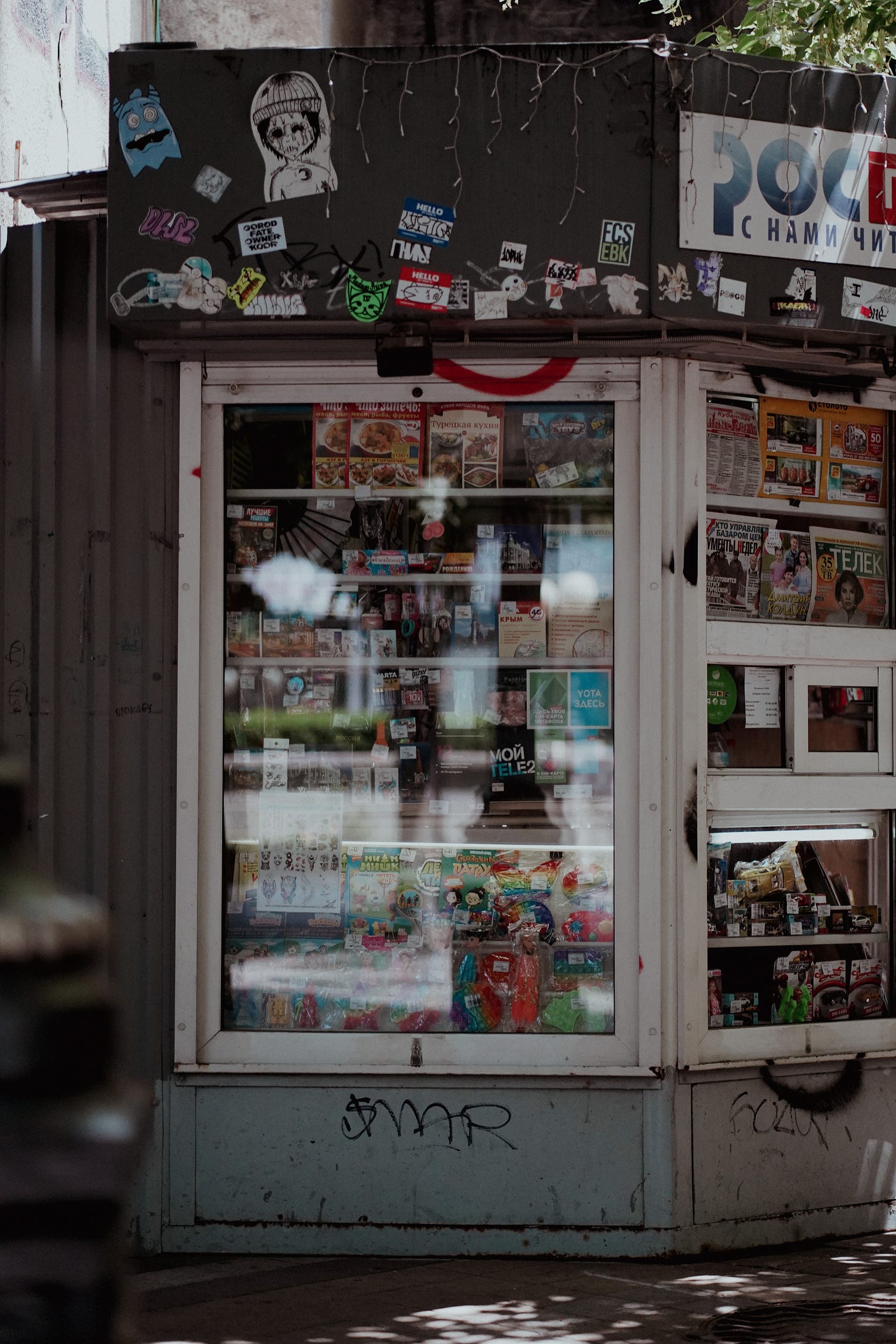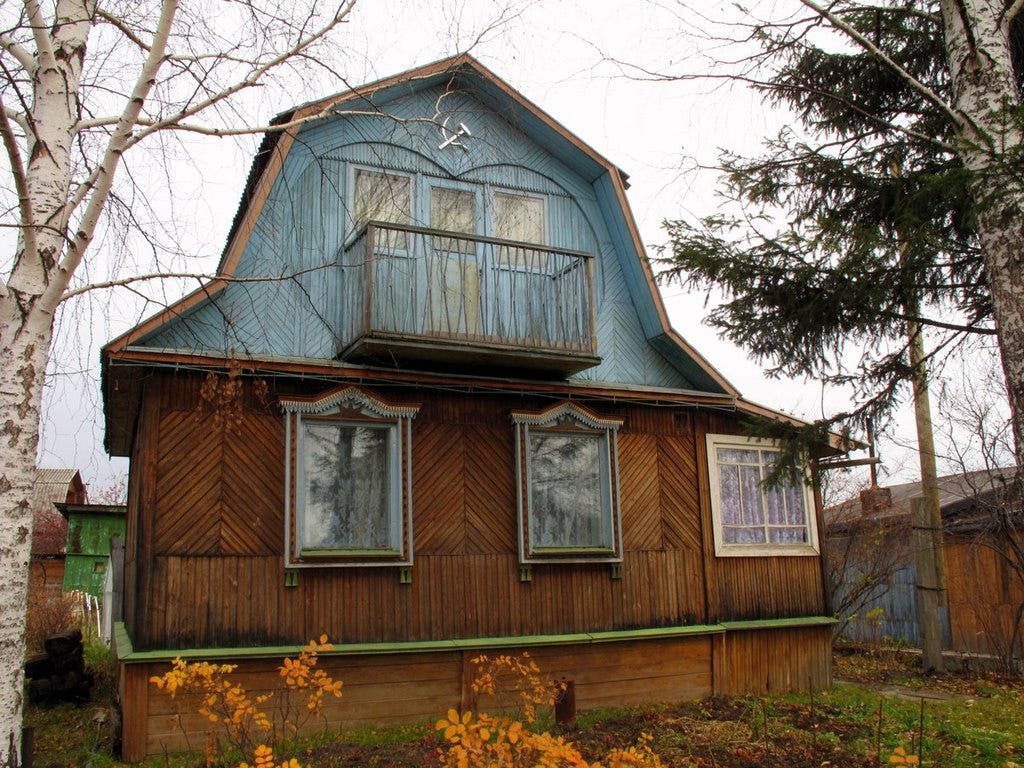Drawn Home
A short short story from far far away
Kat's kiosk was like every other kiosk in wintry St. Petersburg: grimy, flimsy, and frigid. But unlike every other kiosk owner, Kat called hers home.
"Hey, Kat, wake up!" It was 7 am, New Year's Eve, and the local mafia rep, Petya, knocked on the back door anxious to deliver the day's goods. Kat was already awake, but nearly frozen from a restless sleep in her container of commerce.
A month ago, her 49-year old father had suffered a heart attack while moving heavy crates of vodka into the kiosk. To pay the hospital bills, they gave up everything valuable including their apartment. But her father had died less than 24 hours later. She was now alone and homeless at 20.
"You're out of kerosene; I'll bring you more later," Petya muttered as he lugged crates of product with one arm to the back of the kiosk. "Three days of New Years Eve partying is going to make fat stacks for you and me."
Petya, who couldn't be any older than her, was kind and brave but broken. He had dreamed of being an Olympic athlete. Instead, he was a one-armed Soviet Afghan war vet with sunken eyes and a pitted face red as cranberries. Kat wondered if he had a family or a home but had never asked.
As for her, she wasn't broken, just bruised. The more she lost, the tighter she held on to her dream of becoming a famous artist. Although she didn't earn much, sales from her ink drawings advertised alongside chocolates and Coca-Cola helped pay her rent to the mafia with little left to live on. Her drawings were popular. She drew what she saw, mostly the vagaries of city life - child beggars, track-suited mafiosi, and babushkas. It was her drawings of dachas, however, those Russian summer homes that every former Soviet citizen coveted, that she found the most satisfying and lucrative. Everyone dreamt they once lived in a dacha or should have. These were her best sellers.
Once Petya left, Kat swung her still stiff legs over the side of her makeshift bed, prepared some tea, opened shop, and sat down with fountain pen and paper. Petya's angular face came to mind. Instead, she drew the comforting outline of a Soviet-style, two-floor, gambrel-style dacha. She drew in black, but saw only color: the robin's egg blue wooden exterior, the wrought-iron second floor balcony, and the ornate walnut-stained lattice work.
Her plan was to draw 50 dachas today, secretly pocket all of the cash she'd earn over the three-day holiday and skip town as soon as possible. To where, she had not yet decided.
By 9 pm that night, after a day's worth of haggling with customers, shivering to stay warm, and warding off thieving teenagers, she sat back and took in the vast expanse of her drawings. She had exceeded her goal: 60 dachas. They were all unique in some way, yet shared an essence that conjured up one glorious summer home somewhere far off in the distance.
Her reverie was interrupted by a loud bang and people cheering down the street. New Year's Eve partygoers, some already drunk and stumbling, spilled out of the subway towards downtown. It wasn't just thieving drunks she was worried about. It was the rival mafiosi. This time last year, a group of thugs ransacked her father's kiosk. If it weren't for Petya who showed up at the last minute with his mafia friends all brandishing knives, the kiosk likely would have been torched.
Then, an expected knock on the back door. It was Petya, likely already drunk. He stepped in to the small space, towering above her, his red face blotchy, eyes pinched and nearly shut, and mouth twisted. He was more disheveled than usual. His winter coat was unzipped. He motioned vaguely to his belly. Something wasn't right. His shirt was ripped and stained with blood. He was hurt.
Stunned at the sight of him, she jumped to her feet prompting dozens of dacha drawings to fall to the wet floor. She grabbed a portrait of a begging child and pressed it to Petya's wound. It turned red.
"They jumped me," he stammered, "and they're coming again... for us both." She grabbed her coat, a wad of cash, Petya's arm, and slotted as many of her dacha drawings as possible into the back of her family photo album. These were all the things that were worth taking. Out of the kiosk they tumbled, running to the train station. With dachas on her mind, Vyborg was the only destination she could imagine.
"It's not that bad; the bleeding's stopped," he muttered. "We'll find my aunt," she promised. But, she only had a name, no address. The train approached and the winter wind whipped. Anxiously, she jumped to her feet and in her haste dropped her family photo album. Dacha drawings scattered to the wind, flew into the street, onto the snow, into gutters, and even up against the train. Breathless from chasing them down and with tears hot against her frozen face, she gave up and holding the only one she had caught to her chest jumped on the train behind Petya.
Two hours later, the train deposited them in Vyborg. They wandered the streets until sometime around midnight. Finally, they slumped up against a garden shed with an overhang, clear of snow and sheltered from the wind. There they rang in the New Year, holding each other tightly to keep warm. In the morning, they woke, crusty-eyed and hungry.
As they sat there, both chilled by the possibility of a new life, Kat watched a heavy-set old woman across the street step out and pour milk into a bowl for a cat. There was something oddly familiar about the scene. As the old woman turned to walk back inside, Kat noticed the robin's egg blue, wrought-iron balcony, and walnut-stained lattice. "Babushka?!" she cried. The old woman turned, squinted, and called back "Katyusha?"




Well this was simply fabulous!
I am so glad that I found your story! I write about St. Petersburg during the awful 1990s in my memoir also. Your story is very realistic and individualized. Beautifully written. Only one comment, why did you choose Vyborg, the big, former Finnish city with a huge old prison and huge KGB post? Actually, it doesn't matter. It's writer's choice. It just I know Vyborg well.